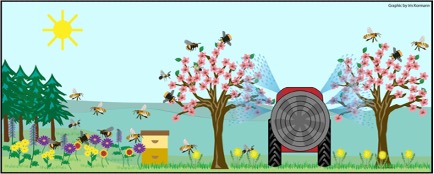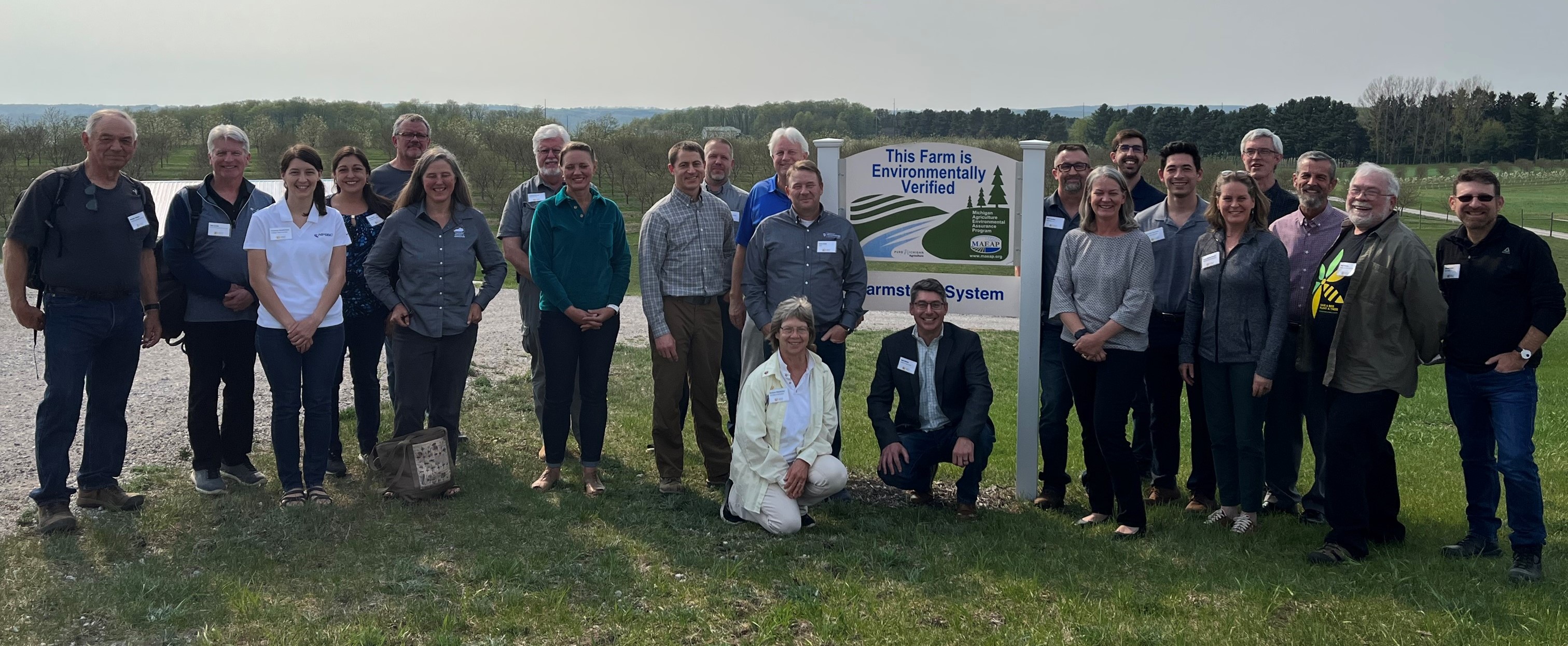Pollinator protection programs and resources from Michigan State University Extension
Supporting pollinator health in Michigan through education and outreach.

The Michigan Pollinator Protection Plan
Pollinator Protection Plans are part of a national strategy by the U.S. Environmental Protection Agency (EPA) for pollinator protection.. Michigan’s original plan, “Communication Strategies for Reducing Pesticide Risk for Managed Pollinators in Michigan,” was written in 2018. This document discusses potential pesticide risks to managed pollinators in the state of Michigan and provides strategies to support pollinator health. Since that time, Michigan State University (MSU) has worked with the Michigan Department of Agriculture and Rural Development to secure annual funding from the U.S. Environmental Protection Agency for MSU to implement strategies outlined in the plan. The plan aims to raise awareness about the effects of pesticides on pollinators, provide education to relevant stakeholders, and drive collaborative solutions to protect pollinators in Michigan. In this article, we provide an update on MSU Extension’s work to advance the Michigan Pollinator Protection Plan.
Pollinator education for home gardeners and the public
MSU supports efforts of gardeners and the public who work to improve pollinator health by learning about pollinators, planting flowers for pollinators and minimizing pesticide exposure. MSU provides information to pollinator enthusiasts, home gardeners and the public through its Pollinator Champions online course, which was updated in 2024. In this free, self-paced course, individuals learn about the pollinators in Michigan, why pollinators are important and what you can do to help pollinators. There is also an option where individuals can become Certified Pollinator Champions and receive PowerPoint slides and printable handouts to provide education to others in their area.
The online article "How do I know if a pesticide is safe for bees? Five steps to protect bees from pesticides”’ summarizes several factors for gardeners, growers, and farmers to consider before applying pesticides.
MSU recorded webinars on pollinator diversity and planting for pollinators, which can be found on the Michigan State University Beekeeping YouTube Channel:
- Michigan Department of Transportation Vegetation Management & Sunflower Plots with Carla Ahlschwede
- Trees for bees: from planting to pruning with Mike Connor
- Large-scale Pollinator Habitat: Seed a Legacy Program
- Flowering Bee Lawns with James Wolfin
- Michigan Bee Plants with Zachary Huang
- The buzz about native bees with Michelle Fearon
- Native bees of Michigan with Rebecca Tonietto
- Pollinator Habitat: Making Every Acre the Best it can be
Many people are interested in establishing large-scale pollinator habitat but don’t know where to start. MSU published case articles that provide examples of experiences and funding to incorporate pollinator habitat on multiple acres.
- A refuge for pollinators: A case study of establishing large-scale pollinator habitat on marginal farmland using federal funds
- Pocket of paradise: A second case study of establishing large-scale prairie planting
- Somewhere for the pollinators to go: A case study of establishing large-scale pollinator habitat
- USDA funds available to establish pollinator habitat on your land
MSU also maintains a website with local contacts and resources for implementing and maintaining pollinator habitat and a directory of native plant producers.
More information on planting for pollinators is available from Michigan Pollinator Initiative resources on pollinator plantings, MSU Extension Gardening for Pollinators website, and MSU Extension Smart Gardening for Pollinators tip sheets.
Pollinator stewardship information for growers
MSU provides crop-specific recommendations to growers about pollinator stewardship and pesticide use. As part of the Michigan Pollinator Protection Plan, MSU collected input from stakeholders to develop the Blueberry Pollinator Stewardship Guide and Vegetable Pollinator Stewardship Guide (also available in Spanish: Guia del Cuidado de Polinizadores de Arándano and Guía para la Gestión de Polinizadores de Hortalizas). Printed copies of the pollinator stewardship guides, along with other handouts on supporting pollinator health, are made available to growers at the Great Lakes Fruit, Vegetable, and Farm Market Expo. Additional online resources for fruit growers include Planning for pollination of fruit crops and Pollinator stewardship during fruit crop bloom.
MSU Extension also supports growers with information on pollinator supportive trees and shrubs for farm and orchard windbreaks to increase pollinator habitat on their farms.

Honey Bee Health Coalition
MSU Extension is a steering committee member of the Honey Bee Health Coalition. The Honey Bee Health Coalition’s Bee Integrated Demonstration Project featured Michigan beekeepers and growers in videos highlighting good communication to support pollination and pollinator health.

Pollinator protection education for pesticide applicators
MSU has provided pollinator education at certified pesticide education clinics since 2015, both independently and in collaboration with Michigan Nursery and Landscape Association.
MSU wrote an appendix for the Michigan Private Applicator Core Manual in 2019 so that people preparing for pesticide applicator certification can learn about pollinators, pollinator health and ways to reduce pesticide exposure. MSU shared this chapter with other states so that they can incorporate similar information into their training programs for pesticide applicators.
Since 2020, MSU has received funding from the North Central Integrated Pest Management Center to coordinate the national Managed Pollinator Protection Plans Working Group of individuals working on pollinator protection plans (MP3s) and related pollinator stewardship initiatives. This group aims to share resources, support states that are drafting or implementing pollinator protection plans, and develop pollinator protection educational materials for certified pesticide applicators.
The working group developed a presentation called “Getting Tough on Pests and Going Soft on Pollinators” to give to pesticide applicators. Educators who train pesticide applicators at recertification credit clinics can request a scripted presentation and a handout on pollinator protection by contacting Ana Heck.
The Managed Pollinator Protection Plans Working Group also developed two online courses, Pollinator Protection for Pesticide Applicators and Pollinator Protection for Land Managers. Upon course completion, certified pesticide applicators in Michigan can request one restricted use pesticide (RUP) credit.
For more information on the Michigan Pollinator Protection Plan, please visit:
- MSU’s webpage on the Michigan Pollinator Protection Plan
- MSU’s webpage on pollinator stewardship resources related to the Michigan Pollinator Protection Plan
- MDARD’s webpage on the Michigan's Managed Pollinator Protection Plan
- Read the plan: Michigan Pollinator Protection Plan: Communication Strategies for Reducing Pesticide Risk for Managed Pollinators in Michigan
Impact reports
- Supporting Beekeepers & Protecting Pollinators - published in 2024
- Supporting Beekeepers & Protecting Pollinators - published in 2023
MSU Extension and Michigan Pollinator Initiative beekeeping & pollinator resources
- Michigan State University Extension Beekeeping & Pollinators website
- Michigan Pollinator Initiative website
- Apiculture programs and resources from Michigan State University Extension
- MSU Extension Beekeeping & Pollinators email newsletter
- MSU Beekeeping YouTube channel
- Michigan Pollinator Initiative Facebook page
- MSU Beekeeping Facebook page
- Ask Extension
Acknowledgments
Thank you to the Michigan Department of Agriculture and Rural Development for securing funding from the U.S. Environmental Protection Agency for Michigan State University to implement strategies in the Michigan Pollinator Protection Plan.
This work is supported by the USDA National Institute of Food and Agriculture, Crop Protection and Pest Management Program through the North Central IPM Center (2018-70006-28883).
This work is supported by the Crop Protection and Pest Management Program [grant no 2021-70006-35450 and 2024-70006-43569] from the USDA National Institute of Food and Agriculture.
Any opinions, findings, conclusions, or recommendations expressed in this publication are those of the authors and do not necessarily reflect the view of the U.S. Department of Agriculture.



 Print
Print Email
Email